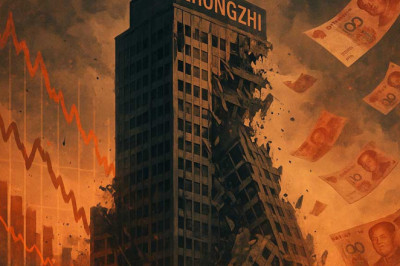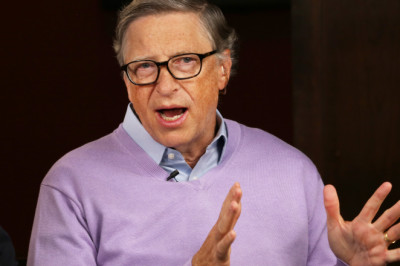
views
Ukraine updates: US warns Russia over satellites threats
SpaceX's Starlink network of satellites is crucial to Ukrainian defense Image: Science Photo Library/imago imageshttps://p.dw.com/p/4IjeXAdvertisement
Washington has warned Moscow against shooting down US satellites after Russian threats that it might target them.
"I would just say that any attack on US infrastructure will be met with a response and will be met with a response appropriate to the threat that's posed to our infrastructure," US National Security Council communications director John Kirby said Thursday.
A senior Russian Foreign Ministry official had earlier said that commercial satellites from the United States and its allies could become legitimate targets for Russia if they were involved in the war in Ukraine.
"Quasi-civilian infrastructure may be a legitimate target for a retaliatory strike," Konstantin Vorontsov, deputy director of the foreign ministry's department for non-proliferation and arms control, was quoted as saying by TASS.
"We are talking about the involvement of components of civilian space infrastructure, including commercial, by the United States and its allies in armed conflicts," Vorontsov was quoted as saying at the United Nations.
Vorontsov did not mention any specific satellite companies, though billionaire Elon Musk said earlier this month that his rocket company SpaceX would continue to fund its Starlink internet service in Ukraine, citing the need for "good deeds."
Musk said last week that SpaceX's Starlink services have not received any funding from the US Department of Defense. Starlink terminals are used in Ukraine by both the military and civilian population.
Russia's military stages nuclear drills
Here are the other main headlines from the war in Ukraine on Thursday, October 27:
The Ukrainian president's daily video address was filmed outside, in the dark, on Thursday marking a change from its usual setting.
Volodymyr Zelenskyy said that Ukraine had shot down 23 Russian-launched drones in the past two days. He was shown standing next to one of the downed pieces of deadly machinery.
Russian strikes have hit crucial parts of Ukraine's electricity network leading to blackouts — which may last longer than originally expected, a Ukrainian official said on Thursday.
But Zelenskyy said the strikes would not have their intended effect. "Shelling will not break us — to hear the enemy's anthem on our land is scarier than the enemy's rockets in our sky. We are not afraid of the dark," he said.
Ramzan Kadyrov, a close ally of Russian President Vladimir Putin and himself the hardline leader of the southern Russian Muslim-majority region of Chechnya, said on Thursday that 23 of his soldiers had been killed by Ukrainian shelling.
Writing on Telegram, Kadyrov said that his soldiers had been killed while in the southern Kherson region of Ukraine. He also said another 58 were wounded.
Russia has rarely given numbers of battlefield deaths. Kadyrov claims that his forces killed some 70 Ukrainians in a revenge attack, but this could not be verified.
Washington has responded to claims of US "military biological programs" in Ukraine made by Moscow as a waste of the UN Security Council's time.
The US and Ukraine have rejected previous similar claims made by Russian authorities, but a new attempt from the Kremlin to call for a formal inquiry from the Security Council has been branded as the spreading of conspiracy theories.
"How much more of this nonsense do we have to endure?" Britain's UN Ambassador Barbara Woodward asked the council.
Her US counterpart Linda Thomas-Greenfield described the claims as "pure fabrications brought forth without a shred of evidence."
The White House is expected to announce a new round of military assistance to Ukraine Reuters reported on Thursday.
The package is likely to include ammunition and further High Mobility Artillery Rocket System (HIMAR) launchers that have played a key role in Ukraine's counter-offensive.
The US has already spent over $17 billion to assist Ukraine hold off Russia's invasion.
Russian President Vladimir Putin, speaking to the Valdai Discussion Club, accused Western nations of using economic sanctions and "color revolutions" against rivals and said they could not compete fairly with the rising economic and political might of Asia.
Putin said Western countries had "thrown aside the rules" of international affairs in order to maintain their domination and hold down what they saw as "second-class civilizations."
According to Putin, the West was playing a "dangerous, bloody and dirty" game over Ukraine, which Russian forces invaded in February. Putin said he believes the United States and its allies would ultimately have to talk to Russia to end the war Moscow started.
Putin also ruled out the option of using nuclear weapons in Ukraine and reiterated his unproven allegations that Ukraine intends to use a "dirty bomb."
Putin lashes out at West in public discussion
He claimed the decade ahead is the most "dangerous" since the end of the Second World War.
He accused the US of squandering its diplomatic relations with China after House Speaker Nancy Pelosi visited Taiwan. He also said Washington had botched its attempt at a nuclear deal with North Korea by introducing sanctions against Pyongyang.
The White House said Putin's speech "wasn't that new" and did not indicate a change in Russia's war strategy.
IMF chief Kristalina Georgieva said financial pledges for Ukraine by the United States and Europe should be sufficient to get Kyiv through 2023, assuming the war does not intensify.
"Yes, we would go to 2023 with sufficient financial support for Ukraine," Georgieva said on the sidelines of a conference organized by the European Commission, the EU's executive arm.
"When we look into next year, the numbers are significant, but they are not out of context of what has been done up to now," she added, underlining that the outlook was highly uncertain.
Earlier in October, Ukrainian President Volodymyr Zelenskyy urged the country's partners to help cover Kyiv's budgetary deficit of $38 billion in 2023.
Russia will retaliate if its state and citizens' assets are confiscated by the European Union, the Russian Foreign Ministry said.
Asked about comments reportedly made by European leaders suggesting Russian assets in the EU could be confiscated, Foreign Ministry spokeswoman Maria Zakharova said this would be "stealing".
"The EU judiciary refuses to protect Russians' property," she said.
The Kyiv region, including the capital city itself, faces a 30% deficit in its capacity to generate the power it needs following Russian strikes overnight targeting energy infrastructure, the regional governor said.
"Last night the enemy damaged the facilities of the energy infrastructure of our region. A number of critical facilities have been disabled," Oleksiy Kuleba said.
Separately, the Kyiv region's military administration said the region must "prepare for emergency power outages for an indefinite period" because of the Russian strikes.
The German government thinks it is unlikely that one of the two pipes of the Nord Stream 2 gas pipeline in the Baltic Sea is still completely intact following explosions in September.
"It's very likely that the act of sabotage with strong explosions had a negative impact on both pipeline routes and that the basic technical accessibility is therefore no longer guaranteed," the government said.
Unexplained blasts in late September caused four gas leaks in the Nord Stream 1 and 2 gas pipelines in the Baltic Sea - two in Swedish waters and two in Danish waters. Many analysts have argued that the blast was intentional and some have said it could have been a Russian act, which Moscow denies.
EU leaders say Nord Stream leaks 'sabotage'
To view this video please enable JavaScript, and consider upgrading to a web browser that supports HTML5 video
Germany has made another request to neutral Switzerland to allow it to re-export Swiss-made ammunition to Ukraine to be used in its war against Russia, after being rebuffed earlier this year. Germany has supplied 30 Gepard tanks to Ukraine and some 60,000 rounds of ammunition.
A spokesman for the Swiss economic affairs department said a letter on the topic had been received from the German Ministry of Defence, adding that Economic Affairs Minister Guy Parmelin "will respond to this letter in a timely manner". The spokesman declined to comment if Ukraine had also made representations to the Swiss government.
In April Bern vetoed the re-export of Swiss-made ammunition used by Gepard anti-aircraft tanks. The 35mm shells were originally supplied by Swiss companies to the German army decades ago, but were blocked from re-export after the Swiss government said deliveries would breach Switzerland's neutrality law.
Igor Sechin, the head of Russia's largest oil producer Rosneft, said that proposals by the European Commission to introduce cap prices for Russian gas were "unthinkable."
Speaking at an international forum in Baku, Sechin said that Western sanctions were destroying corporate law, while the refusal to buy Russian hydrocarbons is leading to an "acute energy deficit," boosting global inflation.
He also said that Saudi Arabia's position on the global oil market was "reasonable" and based on an analysis of oil supply and demand.
The OPEC+ group of global leading oil producers, which includes Saudi Arabia and Russia, agreed earlier this month to cut its combined output by 2 million barrels per day despite opposition from the United States, which wants lower fuel prices.
Authorities in Moscow-annexed Crimea said Thursday that a thermal power plant on the peninsula was targeted by an overnight drone attack, but claimed it was not badly damaged.
"Today at night there was a UAV (unmanned aerial vehicle) attack on the Balaklava thermal power station," the Russian-installed governor of Sevastopol Mikhail Razvozhayev said on Telegram. "The transformer is minimally damaged. There were no casualties," he added.
Meanwhile, overnight damage to the power grid in central regions of Ukraine caused electricity to be cut off. Further supply restrictions are possible, grid operator Ukrenergo said.
"Equipment at the major network of the Ukrainian energy system in the central regions was damaged," it said in a statement on the Telegram messaging app.
Russia has stepped up its strikes on crucial Ukrainian infrastructure including the power grid in recent weeks, leaving millions without electricity or heating for lengthy periods of time as winter approaches.
By appointing Moscow Mayor Sergey Sobyanin as regional coordinator in the war against Ukraine, the Kremlin wants to divert public criticism from the leadership of President Vladimir Putin, according to the latest UK defense intelligence update.
"This measure is likely to lead to a closer interlinking of regional governors into Russia's national security system," the update read.
The greater involvement of regional officials is likely at least partially designed to deflect public criticism away from the national leadership, UK Defense Ministry said.
Australia said it will deploy 70 soldiers to Britain to help train Ukrainian troops there and ship 30 more armored vehicles to bolster Kyiv's war against Russia's invasion.
"We expect this now to be a protracted conflict," Australian Defense Minister Richard Marles told ABC television. The latest package takes Australia's support for Ukraine to about A$655 million ($425 million; €422.5 million) since the Russian invasion in February.
"We're mindful that Ukraine needs to now be supported over the longer term if we're going to put Ukraine in a position where it can resolve this conflict on its own terms," he said.
Australia, one of the largest non-NATO contributors to the West's support for Ukraine, has been supplying aid and defense equipment and has banned exports of alumina and aluminum ores, including bauxite, to Russia. It has also placed sanctions on hundreds of Russian individuals and entities.
Hundreds of Ukrainian cultural sites have been affected by the Russian invasion. UNESCO is using satellite imagery to keep track and prepare recovery.
ab, dh/rt (AFP, AP, dpa, Reuters)











![Live Aid (Queen) Full Concert [1985, London, Wembley Stadium]](https://nexth.city/upload/media/posts/2022-07/29/live-aid-queen-full-concert-1985-london-wembley-stadium_1659093801-s.jpg)









Comments
0 comment